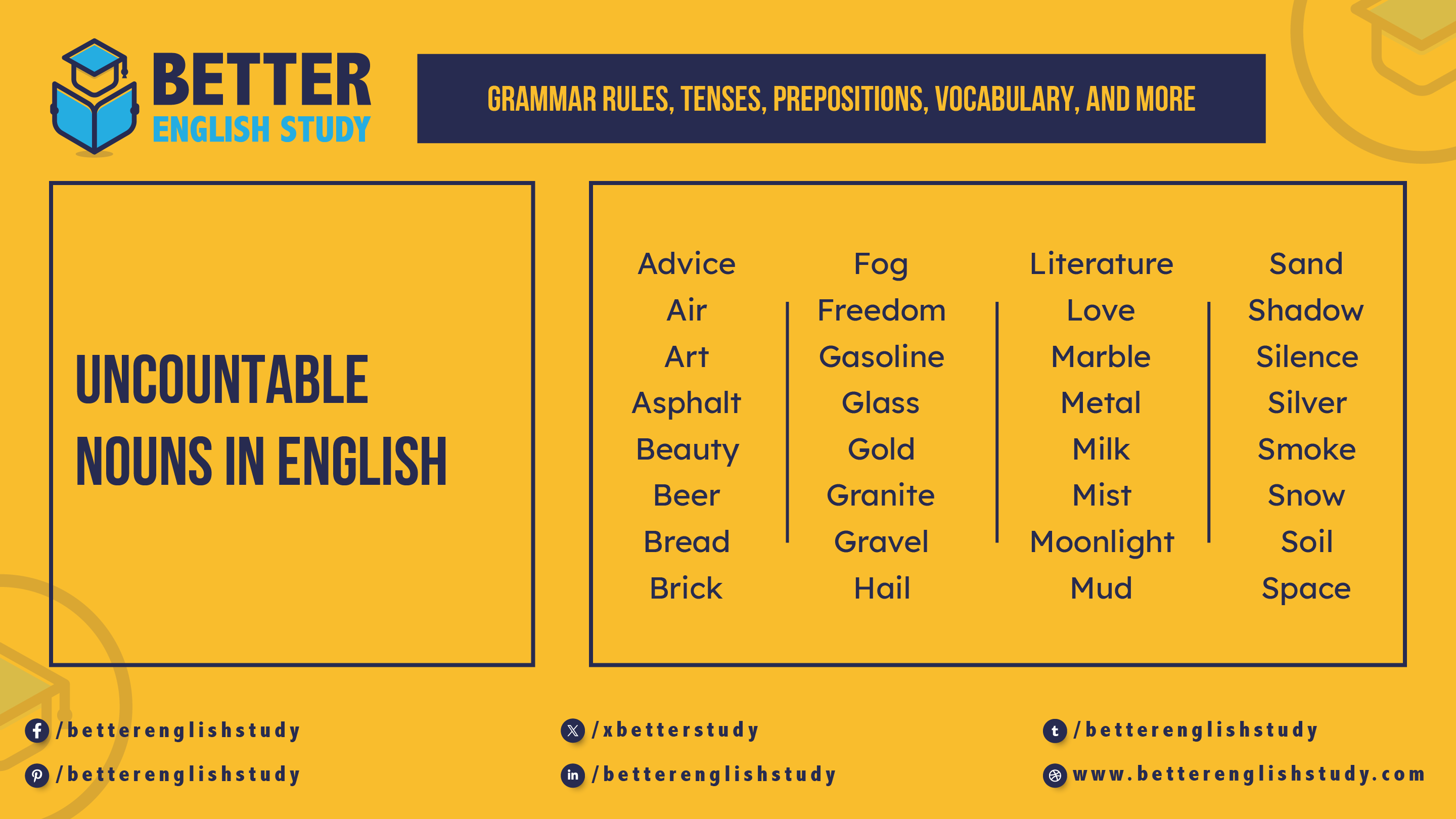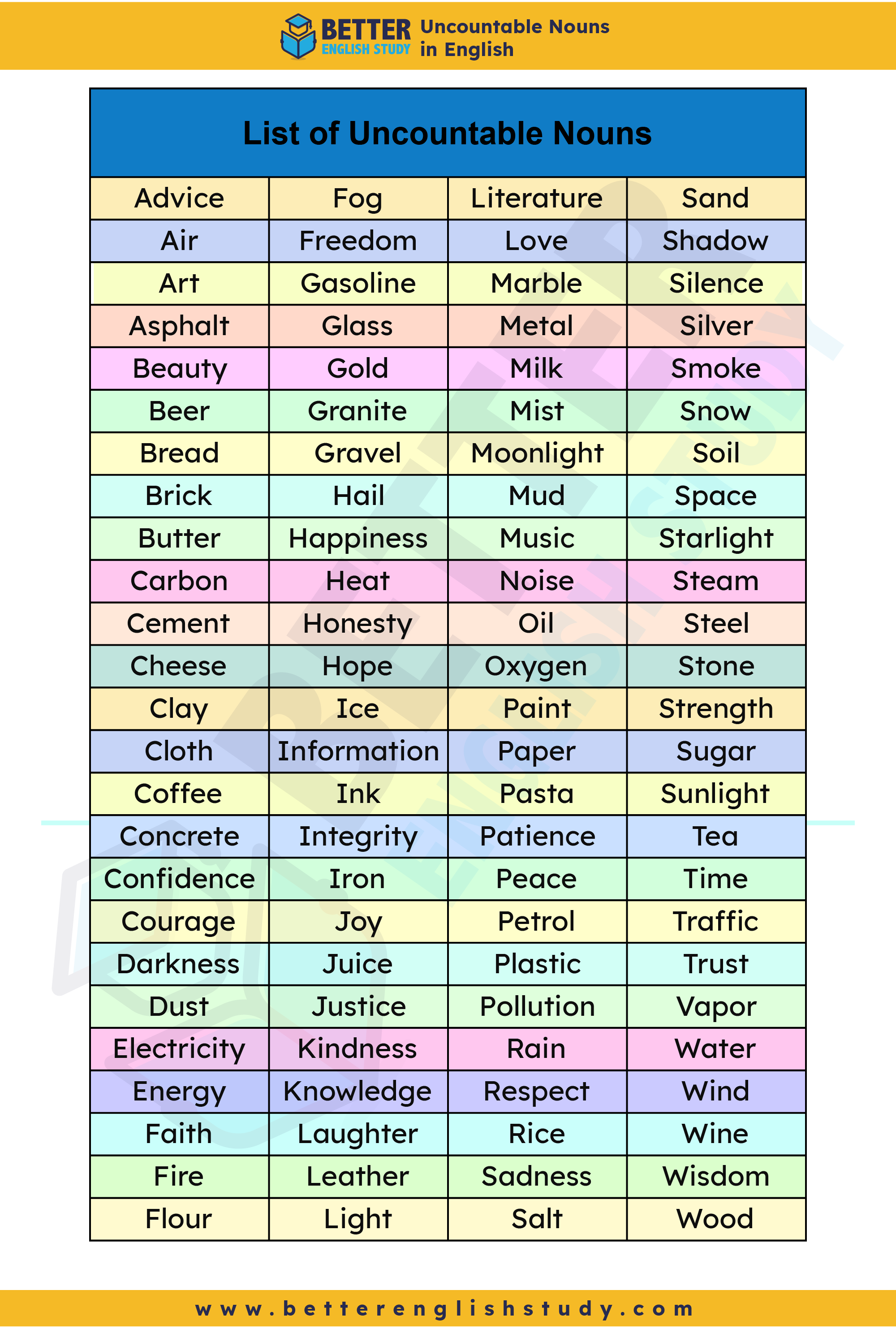
In the vast landscape of the English language, nouns serve as the building blocks of communication, capturing the essence of our reality’s tangible and intangible aspects. Among these, uncountable nouns are a unique category, representing entities that defy simple enumeration.
In this exploration, we will unravel the nature of uncountable nouns, understand their characteristics, and gain insights into identifying them in sentences.
Understanding Uncountable Nouns
Uncountable nouns, as the term suggests, are nouns that cannot be counted as separate, distinct entities. Instead, they denote substances, concepts, or qualities considered indivisible. Even though uncountable nouns are not individual objects, they are always treated as singular entities, requiring using singular verbs in conjunction with them. This means that grammatically, uncountable nouns take on singular forms despite their non-physical or abstract nature.
Uncountable nouns are often called “mass nouns” due to their collective, non-specific nature. This term emphasizes that these nouns represent a mass, quantity, or concept as a whole rather than discrete, countable units.
List of 100 uncountable nouns
| Advice | Fog | Literature | Sand |
| Air | Freedom | Love | Shadow |
| Art | Gasoline | Marble | Silence |
| Asphalt | Glass | Metal | Silver |
| Beauty | Gold | Milk | Smoke |
| Beer | Granite | Mist | Snow |
| Bread | Gravel | Moonlight | Soil |
| Brick | Hail | Mud | Space |
| Butter | Happiness | Music | Starlight |
| Carbon | Heat | Noise | Steam |
| Cement | Honesty | Oil | Steel |
| Cheese | Hope | Oxygen | Stone |
| Clay | Ice | Paint | Strength |
| Cloth | Information | Paper | Sugar |
| Coffee | Ink | Pasta | Sunlight |
| Concrete | Integrity | Patience | Tea |
| Confidence | Iron | Peace | Time |
| Courage | Joy | Petrol | Traffic |
| Darkness | Juice | Plastic | Trust |
| Dust | Justice | Pollution | Vapor |
| Electricity | Kindness | Rain | Water |
| Energy | Knowledge | Respect | Wind |
| Faith | Laughter | Rice | Wine |
| Fire | Leather | Sadness | Wisdom |
| Flour | Light | Salt | Wood |
Identifying Uncountable Nouns
Identifying uncountable nouns involves recognizing words that denote non-specific, unquantifiable entities. Here are some key characteristics and examples to aid in the identification process:
1. Indivisibility
- Example: “Milk” is poured into a jug.
- Explanation: In this sentence, “milk” is uncountable, representing a substance that cannot be divided into separate entities.
2. Abstract Concepts
- Example: “Love” makes life beautiful.
- Explanation: “Love” is an uncountable noun here, expressing an abstract concept rather than something that can be counted.
3. Substances
- Example: “Sugar” sweetens the tea.
- Explanation: “Sugar” is uncountable in this context, signifying a substance rather than individual grains.
4. Use of Articles
- Example: “I need some information.”
- Explanation: The use of the article “some” with “information” indicates that it is uncountable, representing a general concept.
Examples of Uncountable Nouns in a Sentence
1. Water:
- Sentence: She drank a glass of water after her workout.
- Explanation: “Water” is an uncountable noun because it represents a substance that is measured in volume rather than individual units.
2. Music:
- Sentence: We enjoyed listening to soothing music during the evening.
- Explanation: “Music” is uncountable as it denotes an abstract concept rather than a tangible, countable item.
3. Advice:
- Sentence: He gave me some valuable advice before the job interview.
- Explanation: “Advice” is uncountable, as it refers to guidance or recommendations without being quantifiable in specific units.
4. Furniture:
- Sentence: Their living room is filled with beautiful furniture.
- Explanation: “Furniture” is uncountable since it encompasses various items collectively without being individually countable.
5. Traffic:
- Sentence: We got stuck in heavy traffic on our way to the city.
- Explanation: “Traffic” is an uncountable noun representing the flow and congestion of vehicles without specific units.
6. Information:
- Sentence: The library provides a wealth of helpful information.
- Explanation: “Information” is uncountable, denoting a body of knowledge without discrete, countable components.
7. Sugar:
- Sentence: She added a spoonful of sugar to her coffee.
- Explanation: While “sugar” can be countable in specific contexts, in this sentence, it is treated as uncountable, referring to the substance as a whole.
8. Weather:
- Sentence: The weather in the mountains can be unpredictable.
- Explanation: “Weather” is an uncountable noun, representing atmospheric conditions collectively without being individually countable.
9. Love:
- Sentence: They shared a deep and genuine love for each other.
- Explanation: “Love” is uncountable, expressing an emotion rather than a tangible object with discrete units.
10. Homework:
- Sentence: She spent the evening doing homework for her classes.
- Explanation: Although “homework” might refer to individual assignments, in this context, it is treated as uncountable, representing the overall task of studying.

Countable and Uncountable Nouns in Context
In some instances, nouns can be both countable and uncountable, depending on the context of the sentence. Consider the noun “paper.” When we say, “I need a paper to write on,” it is countable, referring to a sheet of paper. On the other hand, when we say, “The room is filled with paper,” it becomes uncountable, representing paper collectively.
- Glass:
- Countable: “I accidentally broke a glass.”
- Explanation: In this instance, “glass” is countable, referring to a specific item that can be counted – a drinking glass.
- Uncountable: “She spilled water all over the glass.”
- Explanation: Here, “glass” becomes uncountable as it denotes the material and not a specific item.
- Countable: “I accidentally broke a glass.”
- Time:
- Countable: “I’ll be there in five minutes.”
- Explanation: In this context, “minutes” makes “time” countable, referring to specific, measurable units.
- Uncountable: “Time flies when you’re having fun.”
- Explanation: In this usage, “time” is uncountable, representing an abstract concept rather than measurable units.
- Countable: “I’ll be there in five minutes.”
- Work:
- Countable: “I have completed two works this month.”
- Explanation: Here, “works” is countable, indicating specific tasks or projects.
- Uncountable: “I have a lot of work to do.”
- Explanation: In this scenario, “work” becomes uncountable, representing the collective concept of tasks and responsibilities.
- Countable: “I have completed two works this month.”
- Money:
- Countable: “I found two dollars on the street.”
- Explanation: “Dollars” makes “money” countable in this context, referring to specific currency units.
- Uncountable: “She has a lot of money in her bank account.”
- Explanation: Here, “money” is uncountable, representing wealth as a collective concept.
- Countable: “I found two dollars on the street.”
- Hair:
- Countable: “She found a gray hair on her pillow.”
- Explanation: In this instance, “hair” is countable, referring to a specific strand of hair.
- Uncountable: “Her hair is soft and shiny.”
- Explanation: When discussing the overall quality of hair, it becomes uncountable.
- Countable: “She found a gray hair on her pillow.”
In conclusion, navigating the realm of uncountable nouns enriches our understanding of language nuances. Recognizing their singular nature and ability to convey abstract concepts or substances collectively allows for more precise and effective communication. So, the next time you encounter a noun that cannot be counted, appreciate the subtle intricacies of uncountable nouns shaping the tapestry of the
